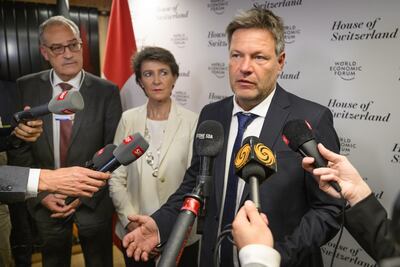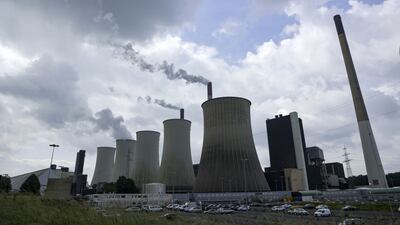Germany could turn to condemned coal plants to keep the lights on if Russia cuts off gas supplies this winter.
The plans drawn up by officials in Vice Chancellor Robert Habeck’s Economy Ministry are the latest stage of Germany’s emergency preparations after the war in Ukraine left it rueing its years-long reliance on Russian gas.
Draft legal proposals seen by The National would allow certain coal plants to reconnect to the power grid if Russian pipelines run dry, despite their operating licences being due to expire in 2022 or 2023.
The new laws would require operators to maintain sufficient coal reserves and would also keep a small amount of oil-fired electricity generation on standby. The coal plants would remain available in emergencies until March 2024.
Ministry sources said the proposals did not alter the aim of Chancellor Olaf Scholz’s coalition to phase out all coal power in Germany by 2030. The government, which includes Green party ministers such as Mr Habeck and has made tackling climate change a priority, brought forward a previous 2038 deadline when it came to office in December.
Coal is regarded as the most environmentally damaging fossil fuel. But the idling plants would not produce greenhouse gas emissions while on standby, the sources said, but would be moved to a higher state of readiness so they could be called upon at short notice.
They would be switched back on once the ministry issued a decree saying gas supplies are low or that such a shortage was imminent.
Despite the potential extension, “we must complete the exit from coal power by 2030,” the sources said. “In the current crisis that is more important than ever.”

The government would not force power companies to reactivate their coal plants in the event of a gas shortage but operators would be reimbursed for the cost of keeping them on high alert.
Officials have rejected a similar reprieve for Germany’s last three nuclear reactors, which are due to go offline at the end of this year.
A study by Mr Habeck’s Economy Ministry found a nuclear extension would be too technically difficult because fuel supplies are due to run out in December and safety certificates will have expired.
Mr Habeck activated the first phase of emergency energy plans in March and urged people to save power. The government believes there is enough gas for the summer but has identified next winter as the potential crunch point.
Germany’s grid regulator has held talks with major energy consumers about how energy could be rationed if there are power shortages in the colder months.
The country is racing to build liquid gas terminals so the fossil fuel can be shipped from other countries, such as the US, rather than arriving through pipelines from Russia.
Mr Habeck says Germany has largely succeeded in replacing Russian coal and oil, meaning it could impose a European embargo on those fuels. But the government does not expect to be independent of Russian gas before 2024.


